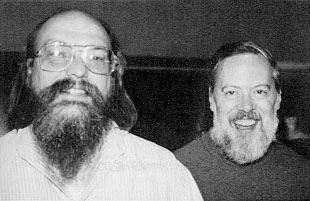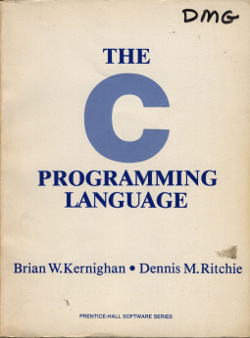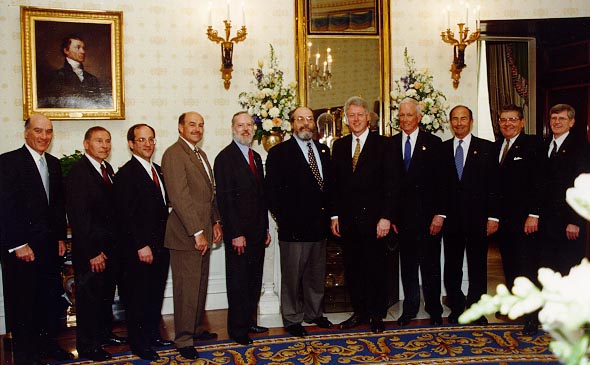Dennis Ritchie
October 17, 2011
Dennis Ritchie, a
computer scientist at
Bell Laboratories who authored the
C programming language and
Unix with colleague
Kenneth Thompson, died on October 8, 2011, at age seventy.[1-9] It was reported that he had been in poor health for several years, having been treated for
prostate cancer and
heart disease.[1] Ritchie retired from Bell Laboratories as head of its system-software research department in 2007.[4]

Ken Thompson (left) and Dennis Ritchie (right).
(Via Wikimedia Commons))
Dennis MacAlistair Ritchie was born on September 9, 1941, in
Bronxville, New York. He received his
B.S. degree in
physics from
Harvard University, and he remained at Harvard for his
Ph.D. in
applied mathematics with a
dissertation on subrecursive hierarchies of
functions. While at Harvard, Ritchie became interested in computers while doing work at the
MIT computer center.[1] Ritchie wrote in his Bell Labs autobiography,
"My undergraduate experience convinced me that I was not smart enough to be a physicist, and that computers were quite neat. My graduate school experience convinced me that I was not smart enough to be an expert in the theory of algorithms and also that I liked procedural languages better than functional ones."[11]
Ritchie's father, Alistair E. Ritchie, worked at Bell Labs in the area of switching theory when Dennis joined Bell in 1967. His initial assignment at Bell was to work on
Multics, one of the first
time-sharing operating systems that was then being jointly developed by Bell, MIT, and
General Electric.
The Bell Labs Multics project was having problems when Ritchie arrived, and it was terminated in 1969 after four years of development.[6] The intangible benefit of Multics was that it brought Ken Thompson, now at
Google, and Ritchie together. Thompson and Ritchie were complementary, Thompson having entered computer science as an
electrical engineer, and Ritchie as a
mathematician.[1]
As a safe haven after Multics, Thompson and Ritchie proposed writing a simplified operating system, one that would become Unix. Since they didn't have much support, they needed to do what many scientists and engineers still do today. They scrounged an older computer with just just 16
kilobytes of
memory, a
DEC PDP-7, whose small memory size ensured that their operating system would run on almost anything. [6] The system, functional in 1970, was originally named Unics, as a pun on Multics.
Working the funding sources, Ritchie and Thompson convinced the Bell Labs
patent department, a veritable paper mill, that Unix with some text processing software would solve many of their problems. In this way, they were able to acquire a better computer, a DEC
PDP-11.[6] They released the PDP-11 Unix system in 1971.[7] The official release date can be traced to the date on the first edition of the Unix programmers’ manual, November, 1971.[8]
AT&T, the owner of Bell Laboratories, was a
regulated monopoly at that time, so it couldn't enter the computing business. As a consequence, Thompson and Ritchie were allowed to distribute Unix at no charge to universities and research institutions.[6] It was distributed as a product to the government and elsewhere. At one time. Bell Labs had high hopes of profitability from Unix. I remember one visit to Bell Labs in 1977 seeing posters on many walls that announced, "Unix is a five letter word," the fifth letter being the
trademark symbol.
After "
divestiture" in 1984, AT&T did try to make a business of Unix, but not very successfully. As Ritchie quipped on his Bell Labs web site, "One of my canned jokes for a while involved the observation that Ken and I had cost AT&T more money than anyone besides
Bill McGowan."[10] McGowan, the founder and chairman of
MCI Communications, was the main force behind the breakup of AT&T.
To sidestep AT&T's
intellectual property rights in Unix,
Linus Torvalds, a
Finnish computer science student, fielded a project to design a free version of Unix.
Linux, as it is now called, was written by many programmers connected by the Internet.[6] In effect, Unix engendered the
free and open source software (FOSS) movement.[2] Click
here for the proper pronunciation of "Linux."
Unix was originally written in
assembly language for the target machines, but it was soon implemented in the
compiled language, C, in 1973.[8] C began as B, a version of
BCPL, a language developed at
Cambridge University and
London University in 1964.[6] Thompson and Ritchie compressed BCPL into a language that would fit in an 8 kilobyte memory, and they called it B. The improved version of B was, of course, named C.[6]
Ritchie's most important contribution was his extension of C by the addition of of new
data types and improved
syntax, thereby enabling Unix to be written in C. This meant that Unix could be compiled for any machine having a C compiler, and this led to its use in many computing environments. C is presently the second most popular programming language (
Java leads by a
small margin).[7]

Early Adapter.
Cover of the author's copy of the first edition (1978) of The C Programming Language by Brian Kernighan and Dennis Ritchie)
Ritchie and Bell Labs colleague,
Brian Kernighan, published their international best seller,
The C Programming Language in 1978 (see photo, above). Their book established the programming tradition of using the
Hello, world program as an example.[8]
Later in his career, Ritchie worked on a programming project called "
Plan 9 from Bell Labs."[4] Its influence must have been in specialized circles, only, since I know more about the
Ed Wood movie,
Plan 9 from Outer Space than the operating system.[13]
Ritchie, along with colleague Thompson, received many awards for their work on Unix and C, as listed below.
• The Association of Computing Machinery's Turing Award (1983).[7-8]
• The IEEE Richard W. Hamming Medal (1990).[8]
• The 1998 National Medal of Technology.[7-8]
• The Japan Prize (May, 2011).[8]

US President Bill Clinton with the 1998 Medal of Technology Awardees, April, 1998. Dennis Ritchie is fifth from the left. Ken Thompson, standing alongside Bill Clinton, is sixth from the left. The award was for "...the invention of the Unix operating system and the C programming language..." (via US National Archives Web Site).
Ritchie was named a Bell Laboratories Fellow in 1983, and he was elected to the
US National Academy of Engineering in 1988.[11]
David Madeo had this interesting Ritchie anecdote.[8]
"I met Dennis Ritchie at a Usenix without knowing it. He had traded nametags with someone so I spent 30 minutes thinking 'this guy really knows what he's talking about.' Eventually, the other guy walked up and said, 'I'm tired of dealing with your groupies' and switched the nametags back. I looked back down to realize who he was, the guy who not only wrote the book I used to learn C in freshman year, but invented the language in the first place. He apologized and said something along the lines that it was easier for him to have good conversations that way."
References:
- Steve Lohr, "Dennis Ritchie, Trailblazer in Digital Era, Dies at 70," The New York Times, October 13, 2011.
- Unix creator Dennis Ritchie dies aged 70, BBC News, October 13, 2011.
- Elizabeth Flock, "Dennis Ritchie, father of C programming language and Unix, dies at 70," Washington Post Blogs, October 13, 2011.
- Stephen Miller, "Dennis Ritchie 1941-2011 - Pioneer Programmer Shaped the Evolution of Computers," Wall Street Journal, October 14, 2011.
- Dennis Ritchie dies at 70; computer scientist helped develop Unix, Los Angeles Times, October 14, 2011.
- Martin Campbell-Kelly, "Dennis Ritchie obituary," Guardian (UK), October 13, 2011.
- Gavin Clarke, "C and Unix pioneer Dennis Ritchie reported dead," Register (UK), October 13, 2011.
- David Schneider, "Dennis Ritchie (1941 - 2011)," IEEE Spectrum, October 13, 2011.
- Sean Gallagher, "Dennis Ritchie, Father of C and Co-Developer of Unix, Dies," Wired News, October 13, 2011.
- Dennis M. Ritchie, Bell Labs Home Page.
- Dennis M. Ritchie Bell Labs Autobiography.
- Dennis M. Ritchie, "The Development of the C Language," Bell Labs/Lucent Technologies Web Site (PDF File)
- Plan 9 from Outer Space, 1959, Edward D. Wood Jr., Director, on the Internet Movie Database; Plan 9 from Outer Space, 1956, YouTube Video; Plan 9 from Outer Space, 1956, Internet Archive Video.
- President Clinton Announces Recipients Of Nation's Highest Science And Technology Honors, White House Office of Science and Technology Press Release No. 456-6108, December 8, 1998.
- Lab Scam on YouTube - Penn and Teller assist Rob Pike and Dennis Ritchie in a prank on Arno Penzias.
Permanent Link to this article
Linked Keywords: Dennis Ritchie; computer scientist; Bell Laboratories; C programming language; Unix; Kenneth Thompson; prostate cancer; heart disease; Wikimedia Commons; Bronxville, New York; B.S. degree; physics; Harvard University; Ph.D.; applied mathematics; dissertation; function; Massachusetts Institute of Technology; MIT; physicist; algorithm; procedural language; Multics; time-sharing operating system; General Electric; Google; electrical engineer; mathematician; kilobyte; memory; Digital Equipment Corporation; DEC; PDP-7; patent; PDP-11; AT&T; regulated monopoly; trademark symbol; divestiture; Bill McGowan; MCI Communications; intellectual property rights; Linus Torvalds; Finnish; Linux; free and open source software; assembly language; compiled language; BCPL; Cambridge University; London University; data type; syntax; Java; The C Programming Language; Brian Kernighan; ; Hello, world program; Plan 9 from Bell Labs; Ed Wood; Plan 9 from Outer Space; Association of Computing Machinery; Turing Award; Institute of Electrical and Electronics Engineers; IEEE; Richard W. Hamming Medal; National Medal of Technology; Japan Prize; US President Bill Clinton; US National Archives; US National Academy of Engineering.